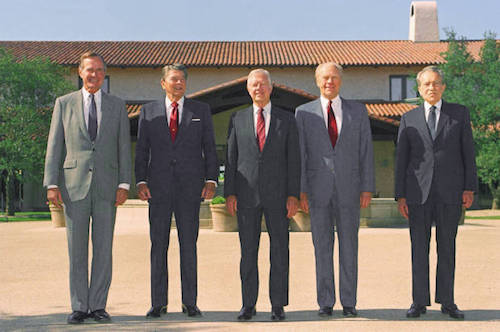“So it must be for ever...”—Perry Anderson's American Foreign Policy and its Thinkers in the LRB
In the most recent issue of the London Review of Books, Thomas Meaney reviews Perry Anderson's recently published analysis of the ways in which the creation of the US state and its imperial ambitions have interacted, American Foreign Policy and Its Thinkers. Read an extract here.

Perry Anderson, in American Foreign Policy and Its Thinkers, his first sustained critique of US power, concentrates on two unstable compounds in the empire’s image of itself, both of which crystallised in the decisive postwar years, when it was still unclear how American utopianism would adjust to postwar realities. The first such ‘compound’ is made up of two elements, exceptionalism and universalism, which Anderson treats as analytically distinct impulses. Providential exceptionalism came first, originating in the Puritans’ attempt to build a ‘city upon a hill’ that would impress the England they had left behind. At least in theory, Anderson suggests, American exceptionalism could be modest. Here he is on firm ground. One of the most forceful denunciations of American expansionism was made eight years before the expression ‘manifest destiny’ first appeared in print, when the leading Unitarian preacher, William Ellery Channing, warned that America’s ‘sublime moral empire’ should ‘diffuse freedom by manifesting its fruits’, since ‘there is no Fate to justify rapacious nations, any more than to justify gamblers and robbers, in plunder.’
American universalism, in Anderson’s view, is more dangerous. It was effectively propagated by Woodrow Wilson, who saw the entire world as a receptacle for America’s values. ‘Lift your eyes to the horizons of business,’ Anderson quotes him telling American salesmen, ‘and with the inspiration of the thought that you are Americans and are meant to carry liberty and justice and the principles of humanity wherever you go, go out and sell goods that will make the world more comfortable and more happy, and convert them to the principles of America.’ On the face of it, the message sounds like Channing’s call to spread American values through non-forcible means, but the circumstances had changed. In 1910 the country’s economic output was higher than that of Germany, France and Japan combined; by the middle of the First World War, it had surpassed that of the British Empire. The country’s excess material power opened fresh possibilities for what Anderson calls ‘messianic activism’.
The second of Anderson’s unstable compounds is the tension between the needs of American supremacy and the needs of global capitalism. For much of the postwar era, US leaders rarely bothered to distinguish between the two: the build-up of US power and capitalist husbandry went hand in hand. When they were forced to prioritise, American leaders tended to privilege political-military global leadership over the needs of capital, with the expectation that this would be better for capitalism in the long run. At Bretton Woods, the US triumphantly established the dollar as the world’s reserve currency and created supporting institutions, including the World Bank and the IMF. Over the cries of Wall Street banks, which demanded a much less constricting set of controls and were privately exploring the idea of lending Europeans reconstruction funds, the Truman administration embarked on a programme dedicated to economic stability. The reconstruction of Japan and Europe – which American historians persist in presenting as unique acts of beneficence – was undertaken to ensure the bedrock of the world capitalist system, even if that meant keeping the European empires on their feet a bit longer. ‘The US state,’ Anderson writes, ‘would henceforward act, not primarily as a projection of the concerns of US capital, but as a guardian of the general interest of all capitals, sacrificing – where necessary, and for as long as needed – national gain for international advantage, in the confidence of ultimate pay-off.’
Visit the LRB to read the review in full.
American Foreign Policy and its Thinkers is available to purchase now from the Verso website with a 20% discount, free bundled ebook, and free worldwide shipping.
